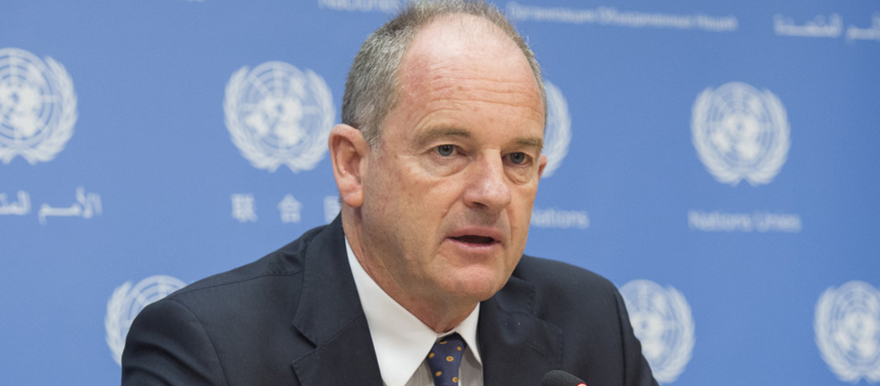The head of the United Nations Mission in South Sudan David Shearer has expressed concern over the delayed implementation of the security sector reforms within the South Sudan peace agreement saying it could delay key aspects of the deal including elections.
Shearer, also the Special Representative of the UN Secretary-General while addressing journalists on Tuesday in Juba noted that although some progress has been made in other areas, there is a significant delay in the security arrangements.
“Critically, there has been no movement on the area of security sector reform,” he said. “At the moment, the process is stuck. It hasn’t moved past the first stage where forces are trained and graduated. Urgent action is needed to move this process forward.”
As part of the September 2018 peace deal, government and opposition forces should form one national army.
“My concern about the delay is that it risks pushing elections out well beyond the timeline of the agreement. This will add to the growing disillusionment amongst communities about whether the political will exists to give South Sudanese citizens the opportunity to choose their leaders,” Shearer continued.
The UN official further called on the peace parties to urgently work and ‘breathe new life’ to the process.
“The international community and regional partners play an important role but the parties themselves must also step up their efforts to regain lost momentum,” he added.
Another area that requires urgent implementation according to Shearer includes the completion of the state governors’ appointments, appointments at the county level governments, and most importantly the reconstitution of the Transitional National Legislative Assembly which will allow for new laws and progress on the constitution.
Shearer also noted that cantoned soldiers are growing weary due to lack of food and logistical support, leading to many leaving the sites and becoming a source of insecurity in many parts of the country. He urged the urgent integration of the soldiers.
Recurrent clashes
The UN head also said their records indicate that there have been more than 500 violent conflicts within the country for the first seven months of this year.
He said the violence aggravates the situation of the already suffering South Sudanese who have been affected by COVID 19, massive floods, and intercommunal conflicts.
“From January to July this year, UNMISS documented 575 incidents of subnational violence – which is three times higher than the number compared to last year,” Shearer said.
He added that there is an immense appeal to the UN from different conflict-affected communities to provide peacekeepers and encourage reconciliation.
UN-SSPDF relations
On the relationship between the government army and the mission, Shearer said there has been a change in approach by the SSPDF that does not encourage cooperation.
Last month, the SSPDF blocked a team of peacekeepers sent out by UNMISS last week to establish a temporary base in Lobonok after reports of clashes between the opposition National Salvation Front (NAS) and forces belonging to SSPDF and SPLA-IO.
Shearer reiterated that the mission continues to respect the sovereignty of South Sudan by abiding by an agreement requiring them to notify South Sudanese authorities of their movements around the country.
But he says, the authorities do not reciprocate this principle that allows them to carry out their mandate to protect civilians and to build peace.
“As a result, we have had to report these persistent obstructions to regional and international players, including the Security Council and the African Union. It tarnishes the reputation of the SSPDF, and it will have knock-on effects into other areas of cooperation,” he added.
Withdrawal of peacekeepers from POCs
In August UNMISS announced that the mission is planning to withdraw its forces from some PoCs and hand over the protection of Civilian sites (PoCs) to the transitional government.
However, IDPs in the camps in Juba, Bor, and Bentiu have protested the decision to withdrawal peacekeepers saying their lives are still in danger as security arrangements remain unimplemented.
But addressing the issue in his statement, Shearer said, state authorities will take on the responsibility to protect the IDPs but the UN will always provide security and humanitarian assistance when required.
“It’s very important to note – as the people in Bor have already experienced – that we’re not closing anything. We’re simply withdrawing our forces and saying this is no longer an extension of our base, this is South Sudanese land as every other IDP camp across the country is. So, there’s no distinction that we’re making. We’re still there,” he stated.
He added that the process is a gradual one and appreciated the support and willingness of local authorities to implement the process.




